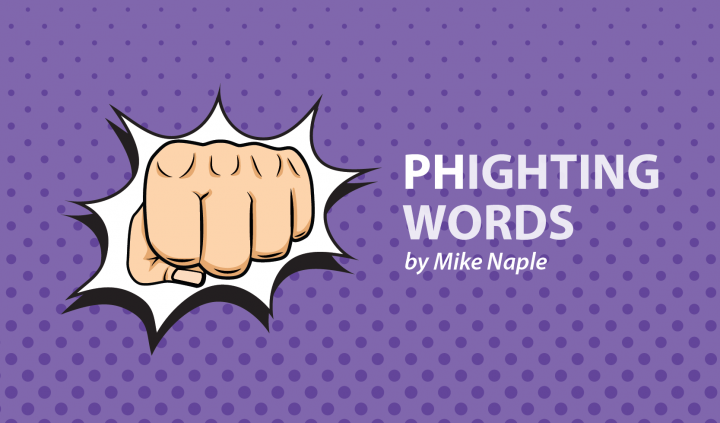Using the Muppet Theory to Explain Anxious Episodes
Written by |

Are you a Grover or a Bert? A Cookie Monster or a Kermit the Frog? You’re probably wondering what Muppets have to do with my journey living with PH. Stay with me.
I recently discovered the Muppet Theory, thanks to a colleague who recently asked me if I was a Chaos Muppet or an Order Muppet. A what? “I used to be a big fan of Fozzie Bear growing up. Is that what you’re asking me?” The theory was explained to me by a Slate article from 2012, which used the Muppet Theory to explain U.S. Supreme Court dynamics.
As the article describes, the Muppet Theory is “a little-known, poorly understood philosophy that holds that every living human can be classified according to one simple metric: Every one of us is either a Chaos Muppet or an Order Muppet.”
Cookie Monster and Grover are emotional types and so they are described as Chaos Muppets. These Muppets are often blue and fuzzy and display turbulent reactions to what life throws their way.
At the other end of the spectrum live the Order Muppets, who tend to be strict organizers and planners who keep the trains running on time. Order Muppets include Bert and Kermit the Frog. They tend to dislike surprises and could be described as classic Type A personalities. Some of them sport excessively large eyebrows.
The Muppet Theory can be considered within the context of a relationship or in workplace scenarios where Order Muppets and Chaos Muppets come into direct contact with one another. I suppose the idea is that a Cookie Monster and a Kermit the Frog would balance each other out for optimum coexistence. (I’m sure that’s exactly how things worked down on Sesame Street or in the Muppet Babies’ Nursery.)
After learning this new way of looking at the world, my mind wandered to the experience of living with a chronic illness. Pulmonary hypertension (PH) has really changed my life introduces a lot of frustrations like breathlessness after climbing to the top of a short staircase or trying (often, failing) to regularly keep to a low-sodium diet. This results in anxiety spikes.
Ask questions and share your knowledge of PH in our forums.
My reaction to spiked anxiety isn’t always the same. Sometimes it looks more like anger or irritability. That happens after I’m sucking for air after doing a simple household task, like making the bed. I get stuck with a momentary sense of hopelessness. If such an easy chore drops my oxygen levels, the idea of doing more energy-intensive activities seem impossible. If my anxiety surges during a clinic appointment, it’s usually manifested through a series of questions for the doctor or a recap from me of everything we’ve just discussed. I believe that is a subconscious attempt to restore a sense of order to help lower anxious feelings and recalibrate my thoughts about the appointment.
My feelings of anxiety do not exclusively originate from my PH. But I do think they’re often exacerbated by how much uncertainty comes from this rare disease with no cure. Some days, it can be harder to keep these feelings at bay, like when a flare-up occurs. If I classified my anxiety reactions according to the Muppet Theory, they would probably be a stubborn mix characterized by both the Order Muppet and the Chaos Muppet. When I align more with the Order Muppet and need to figure out a pathway to less anxiety, I often cook after work and use the steps of the recipe to turn down those alarm bells.
On the days when I experience an anxiety episode closer to the Cookie Monster end of the scale, I give off more of an emotional response, best dealt with a yell or an indulgence in something not included on the low-sodium diet list. Having this disease has created a near-constant internal debate about whether anxiety or shortness of breath is tougher to deal with on a daily basis.
No two PHighters are the same. We all experience this horrible disease in our own ways. The Muppet Theory is hardly elegant, but it fits nicely in my case. Balancing out an anxious Bert and or distressed Gonzo is all about day-to-day maintenance, vigilance, and self-care.
Follow Mike Naple on Twitter @mnaple.
***
Note: Pulmonary Hypertension News is strictly a news and information website about the disease. It does not provide medical advice, diagnosis, or treatment. This content is not intended to be a substitute for professional medical advice, diagnosis, or treatment. Always seek the advice of your physician or other qualified health provider with any questions you may have regarding a medical condition. Never disregard professional medical advice or delay in seeking it because of something you have read on this website. The opinions expressed in this column are not those of Pulmonary Hypertension News or its parent company, Bionews Services, and are intended to spark discussion about issues pertaining to pulmonary hypertension.





Susan Anne Stoddard
What causes this?? I constantly have to take deep breaths especially at night and I have anxiety to the point where I’ve been on meds for years for it. I’m 70 now and less active than I used to. Get short of breath often! Have inhalers! Just thinking about my future!
Catherine
I have the same also 70 what is it ??